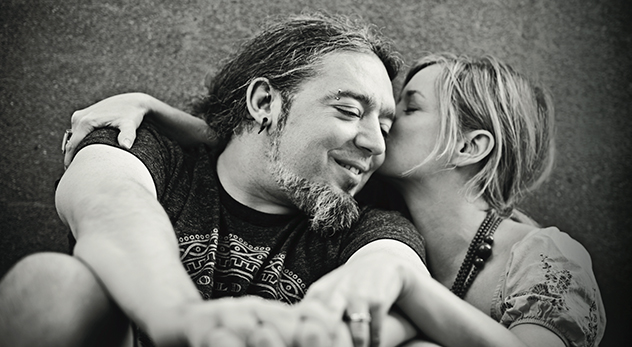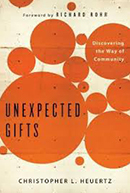
Author and activist Chris Heuertz talks about hidden gifts, divine loneliness, and how to do “good” better.
Chris Heuertz (41) hasn’t lived in 70 countries to see the world, but to live in the world. He and his wife, Phileena, have worked tirelessly on behalf of the underprivileged, diseased and downtrodden and they’ve recently founded “Gravity, a Center for Contemplative Activism”. In Chris’s new book, Unexpected Gifts: Discovering the Way of Community, he shares the importance of biblical community and contemplative activism. From his home Omaha, Chris talks about hidden gifts, divine loneliness, and how to do “good” better.
JM: What are some “hidden gifts” you discuss in the book—things normally seen as trials or curses, but that you say can build up a community and the people within it?
CH: Our notions of community are sometimes filled with unrealistic idealizations of what it should be or what it might become. Many of those expectations often lead to disappointments, and in turn we find ourselves perpetually transitioning in and out of communities looking for the perfect one. If we stay in a friendship, relationship or community long enough, we will experience inevitable challenges. These inevitable challenges (things like failure, doubt, betrayal, the mundane, a loss of identity, sexual chemistry, messy transitions and others) are legitimate reasons for people to leave their communities. However, sometimes the reasons we leave are actually invitations to stay—and when we stay and work through these inevitable challenges, they often become unexpected gifts.
JM: We often talk about community like everyone already knows why it is so important, but I don’t know that’s true. So tell me, what is the importance of community?
CH: I fundamentally believe we are defined by our relationships. This points to a deep and existential yearning in each of us to belong, to be known, to be loved and to love. Taking this even further, this might be bad theology to suggest that the creation of humanity was predicated as much by God’s love as by God’s loneliness. Maybe somewhere in that thought there’s an echo of an underexplored truth. After all, love, by its nature, is self-giving and needs a subject.
And if there is such a thing as divine loneliness, I imagine our need for relationships is one of those subtle indicators that we actually are made in the image of God. We need friendship. There is a deep longing in each of us for authentic and intimate human relationships. Could it be that we possess a sort of existential hard wiring for community, something that touches us in the most vulnerable parts of our identities and draws the divine out of us?
JM: What led you and Phileena to start over in a new place and found Gravity, a Center for Contemplative Activism?
CH: For 20 years, my wife and I have given ourselves to grassroots movements of hope among some of the most vulnerable of the world’s poorest people. We’ve helped establish multi-ethnic, multi-national and ecumenical communities all across the globe.
In South Asia, we founded the region’s first pediatric AIDS care home, offering safe haven and family to children orphaned because of AIDS or suffering with the disease themselves. During West Africa’s infamous “Blood Diamonds” civil war, while rebels controlled 60% of the territory in conflict, we brought vision, volunteers and resources—ultimately establishing a community to address the needs of children who were forced to fight in battle. Throughout Eastern Europe, South America and South East Asia we’ve supported women and children—many of them trafficked into prostitution— journey from the commercial sex industry to freedom.
Around the world, we have invested in communities of youth who live on the streets, in sewers or slums. Some of these children work on trash heaps scavenging for recyclable or resellable items. Many are so hungry they “smoke” cellophane bags of paint or glue to curb the hunger pangs. In the worst cases, some are forced to sell sex as their only option for survival.
Our vocation of hope has literally taken us all over the world, having lived on four continents and traveled to nearly 70 countries. We’ve seen a lot. We’ve sacrificed a lot. We’ve received a lot. We’ve learned a lot.
There’s much good being done in the world and there’s much more that needs to be done, but it will take awakened individuals to make change. It will take transformed communities to forge lasting partnerships towards hope. It will take a movement.
Gravity, a Center for Contemplative Activism is established to support such a movement.
JM: What is contemplative activism, and why have you devoted the next phase of your life to this?
CH: Though activists and social justice workers live faithfully into compelling vocations of compassion, they are sometimes the grumpiest, crustiest and meanest people out there—often down right unpleasant folks to be around. Many who fight to alleviate poverty are unhappy. Loneliness and sadness are familiar companions in their work for hope. Sometimes the stereotypical “dirty hippie” social justice advocate offers an uninviting example of how to serve beautifully for the common good.
Many practitioners involved in causes, charities or communities of hope often do a much better job of taking care of those they serve than they do taking care of themselves.
Sadly, many social justice activists are unhealthy—physically, mentally, emotionally and spiritually. Of course, this is understandable given that most folks involved in grassroots work in places of poverty experience versions of secondary post-traumatic stress disorders. What they see, the work they do, and the solidarity of suffering with their exploited friends ultimately takes a toll on their personal health.
It is the luxury of the non-poor to be able to make healthy choices and options for themselves, but in many cases this comes with a price—feelings of guilt or undue self-critiques of entitlement. Often those engaged in the difficult work of justice perpetually teeter on the edge of burnout. Countless young people sign-up for volunteer opportunities, internships and even careers of service and while some find ways to sustain and thrive in these callings, most are not as fortunate. It’s not uncommon for activists to leave vocations of service disillusioned. Some even walk away from their faith.
Gravity, a Center for Contemplative Activism, is a grounding place for people to root their social engagement in a deep, contemplative spirituality in order to do good better. Gravity doesn’t exist simply for social justice activists, but for anyone and everyone who wants to make the world a better place. This is tough work and everyone involved needs to be grounded in the effort to bring love, hope and peace to the world.
We can live better.
We can love better.
We can serve better.
…we can do good better.
Through Gravity, a Center for Contemplative Activism we will support those who want to do good better.






